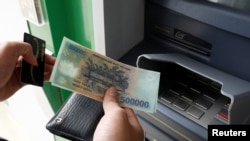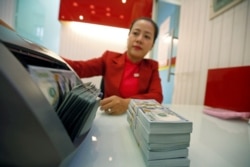Vietnamese savings are reaching new highs, but observers disagree about whether saving so much is a good sign.
Market research company Nielsen found in a survey last month that Vietnam has one of the world's highest rates of consumer savings, with 69% of Vietnamese surveyed saying they put spare cash into savings, compared with 68% in Hong Kong, 66% in China, and 62% in Indonesia.
As a developing nation, Vietnam is becoming increasingly wealthy, and citizens are saving more, joining a global trend of increased savings.
Although saving seems good for individuals, observers, from Deutsche Bank strategist Binky Chadha to former U.S. Federal Reserve chair Ben S. Bernanke, have worried there is a surplus in savings in the world economy, which can distort the broader investment environment and lead to negative interest rates — meaning retirees must pay to keep their savings in a bank.
'An asset bubble'
In the U.S. for instance, the excess savings have pushed the stock market to record highs, which analysts say is approaching a bubble. In Vietnam, the excess savings has also fed an asset bubble, particularly in real estate.
Vietnam’s economy is growing quickly but experts disagree on how to interpret the wealth that it is generating. On the one hand, there may not be enough productive investments available, so savers are investing in luxury real estate that is feeding a bubble, according to a research note by Oxford Analytica. On the other hand, being able to set aside so much money is a positive sign from consumers, according to Nielsen Vietnam.
“As more and more people feel confident about their future, despite better job security, they are putting away more for a rainy day rather than spending today,” Louise Hawley, managing director at Nielsen Vietnam, said. “This also suggests optimism in what tomorrow will bring.”
A sign of anxiety?
However the high savings rate could also be interpreted as a sign of anxiety, as people worry they will need the money for retirement.
"One of the main reasons why Vietnamese people have to save is because there is no social security network,” a commenter wrote in the local newspaper Thanh Nien.
This means Vietnam is part of a global trend identified by Chadha. He noticed that savings rates are going up, even though interest rates are going down, sometimes to negative rates, so people are not saving money to earn interest. Instead Chadha sees this as a sign that people are saving because they fear they will not have enough funds in the future.
Vietnam’s savings rate is not an isolated issue. Bernanke argued that Asia, particularly China, has earned so much from exports that the money has contributed to a “global savings glut.” More recently Vietnam has also become one of the developing Asia nations with high exports and, therefore, a current account surplus.
This has implications for the rest of the world. Like China, Vietnam uses its surplus to buy U.S. Treasury bonds, stoking worries that the U.S. is increasingly indebted to foreign nations. The high demand for U.S. bonds is also a reason the U.S. doesn’t have to pay a lot of interest on its bonds, thus driving down interest rates.
Vietnam also uses its surplus to buy a lot of foreign currency reserves, particularly U.S. dollars. The U.S. Treasury complained in a report this month that this helps drive up the value of U.S. dollars and drive down the value of the Vietnamese dong, making Vietnam’s exports seem even cheaper at a time when the Trump administration wants U.S. consumers to buy fewer Vietnamese products.
“Vietnam should reduce its intervention and allow for movement in the exchange rate in line with economic fundamentals,” the report said.
Still, in Vietnam Hawley said there is reason for optimism. Her company’s survey last month indicated the Southeast Asian nation has one of the world's highest levels of consumer confidence, just after India and the Philippines.
As with savings, however, the indications on financial security could go either way.
Of surveyed Vietnamese 77% said they felt secure, which is lower than the level indicated at the same time the prior year, but higher than the level seen in the previous quarter’s survey.






